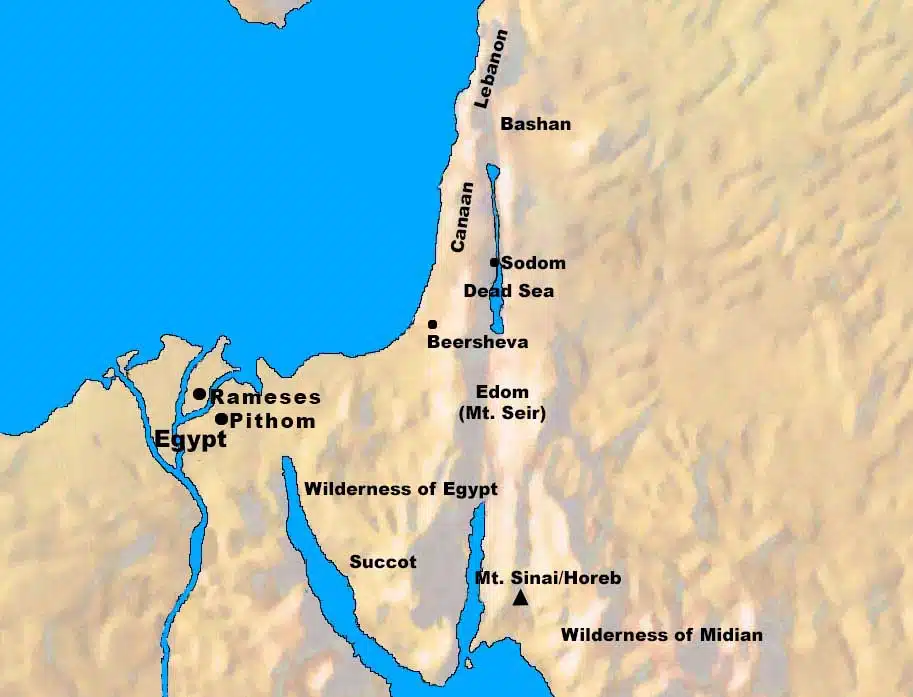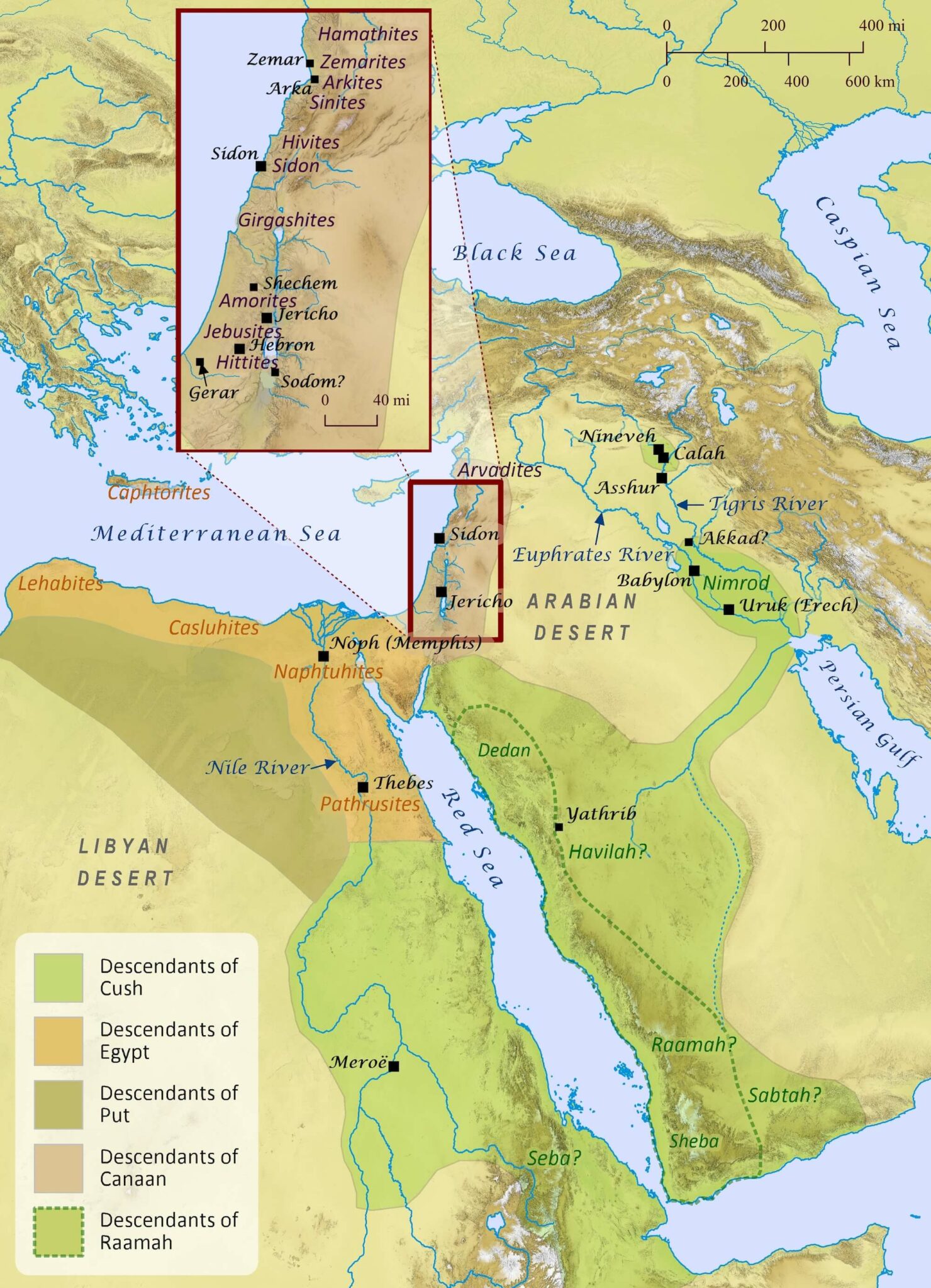Whereas the first answer involves who God is, the second answer contains a description of what He does.
God’s second answer to Moses’ objection starts in verse 15 and continues to the end of the chapter. The word furthermore signals that this is a second answer. This answer is different from the first one in that the first answer states God’s name and the second answer states God’s intentions. The first speaks to His person, the second to His works.
God continues to instruct Moses on what to say to the Israelites (Thus you shall say to the sons of Israel). He once again identifies Himself, this time in more detail by saying ‘The Lord, the God of your fathers, the God of Abraham, the God of Isaac, and the God of Jacob, has sent me to you.’ In other words, God is identifying Himself with the God that spoke to the forefathers of the Israelites. Many promises were made to Abraham, Isaac, and Jacob by the same God, and it is the God of the patriarchs that sent Moses to the Israelites to oversee the fulfillment of those promises.
The Hebrew word translated the LORD in verse 15 is the same root translated as I AM in verse 14. The difference here is that it is in the 3rd person singular (“he is”). The phrase I AM describes the nature of God, and this verse gives what I AM is to called – “He is.” The Hebrew word is “Yahweh”, which means “He is.” In the NASB, “Yahweh” is translated as “the LORD” (with all capital letters). The LORD is also referred to as Elohim, which is translated God when the context makes it clear that the Elohim being referred to is the LORD. “Elohim” can also refer to false gods, to angels (as in Psalm 8:5) and even to humans (as in Psalm 82:6, quoted by Jesus in John 10:34-36). However, Yahweh always refers to the LORD.
God further states that This is My name forever, and this is My memorial-name to all generations. In the Old Testament, “name” is more than what one is called. It refers to the character, reputation, or nature of the person. It is not unlike today when we say “preserve my name” (i.e. reputation). The word translated memorial-name is the Hebrew word for “remember” or “remembrance.” In many places, to “remember” the LORD is to praise and worship. In other words, the only One worthy of worship is the One called Yahweh, and this praise, like Yahweh Himself, is to last into eternity. And the primary nature of the LORD is the I AM, the author and sustainer of all that exists. All things that exist are an extension of the LORD, save the LORD alone.
Now that the One sending Moses has been fully identified, The LORD now instructs Moses to Go and gather the elders (the leaders of families) of Israel together and say to them that which He plans to do. The first item Moses is to tell them is that the Lord, the God of your fathers, the God of Abraham, Isaac and Jacob, has appeared to me, saying, “I am indeed concerned about you and what has been done to you in Egypt. The Hebrew word translated “concerned” is often translated “visit.” The author of all existence is a person who is concerned about individual people within His vast creation.
Yahweh then details what is going to happen based on his visitation. God describes what he will do for the Israelites: I will bring you up out of the affliction of Egypt to the land of the Canaanite and the Hittite and the Amorite and the Perizzite and the Hivite and the Jebusite, to a land flowing with milk and honey. Here the LORD gives an overview of the plan and repeats what He said to Moses’ first objection – deliverance from Egypt and deliverance to Canaan. This is what the LORD promised Joseph (Genesis 50:24).
The LORD then foretells how the Egyptians will behave. The LORD even says to Moses when you with the elders of Israel will come to the king of Egypt and you will say to him, ‘The Lord, the God of the Hebrews, has met with us. So now, please, let us go a three days’ journey into the wilderness, that we may sacrifice to the Lord our God.’ It is interesting that the LORD gives Moses the words to say to the king of Egypt. It is possible that the significance of three days’ journey into the wilderness is that it would place them outside the border of Egypt and away from Pharaoh’s control, it is also possible that the request truly was for a three day journey. However, it seems more likely that the request to travel a three day journey did not imply to Pharaoh that they would return. It was clear to him and the Israelites from the beginning that a request to travel a distance of a three day journey did not indicate that they would ever return. From this point forward, this commentary presumes that the request to travel a three day journey to sacrifice to the LORD indicated to everyone from the beginning that the Israelites would not be obligated to return.
The LORD then warns Moses that his efforts will be rejected and that He has a plan for that as well. He says I know that the king of Egypt will not permit you to go, except under compulsion. The phrase translated under compulsion is literally “except with a strong hand.”
In response to Pharaoh’s action, the LORD says I will stretch out My hand and strike Egypt with all My miracles which I shall do in the midst of it; and after that he will let you go. The “miracles” are the plagues which begin in chapter 7.
Being delivered will not be the only result of the LORD’s work. The LORD promises I will grant this people favor in the sight of the Egyptians; and it shall be that when you go, you will not go empty-handed. So, not only will the LORD free them from Egyptian slavery, He will enrich them with the wealth of Egypt. What is interesting here is that the wealth is given to the Israelites voluntarily – not a shot was fired by an Israelite (so to speak) to make any of this happen. Both the deliverance and enrichment of the Israelites are purely the sovereign work of their gracious LORD.
Biblical Text
15 God, furthermore, said to Moses, “Thus you shall say to the sons of Israel, ‘The LORD the God of your fathers, the God of Abraham, the God of Isaac, and the God of Jacob, has sent me to you.’ This is My name forever, and this is My memorial-name to all generations. 16 Go and gather the elders of Israel together and say to them, ‘The Lord, the God of your fathers, the God of Abraham, Isaac and Jacob, has appeared to me, saying, “ I am indeed concerned about you and what has been done to you in Egypt. 17 So I said, I will bring you up out of the affliction of Egypt to the land of the Canaanite and the Hittite and the Amorite and the Perizzite and the Hivite and the Jebusite, to a land flowing with milk and honey.”’ 18 They will pay heed to what you say; and you with the elders of Israel will come to the king of Egypt and you will say to him, ‘The Lord, the God of the Hebrews, has met with us. So now, please, let us go a three days’ journey into the wilderness, that we may sacrifice to the Lord our God.’ 19 But I know that the king of Egypt will not permit you to go, except under compulsion. 20 So I will stretch out My hand and strike Egypt with all My miracles which I shall do in the midst of it; and after that he will let you go. 21 I will grant this people favor in the sight of the Egyptians; and it shall be that when you go, you will not go empty-handed. 22 But every woman shall ask of her neighbor and the woman who lives in her house, articles of silver and articles of gold, and clothing; and you will put them on your sons and daughters. Thus you will plunder the Egyptians.”
Check out our other commentaries:
-
Romans 12:17-19 meaning
We aren’t God. Our role is not to right all wrongs, especially personal wrongs. If we seek to pay people back for how they’ve treated...... -
Psalm 139:23-24 meaning
David asks God to examine him and his character, identifying the sin so that God can show him the way to eternal life....... -
Daniel 10:1-3 meaning
During the reign of King Cyrus, Daniel receives another message from God about a great conflict in the future....... -
Exodus 28:29-30 meaning
God commands that the Urim and the Thummim be placed in the breastpiece over Aaron’s heart....... -
Deuteronomy 13:12-18 meaning
Moses commands the Israelites to destroy an entire city that has succumbed to the enticements of the false prophets and has fallen into idolatry.......




